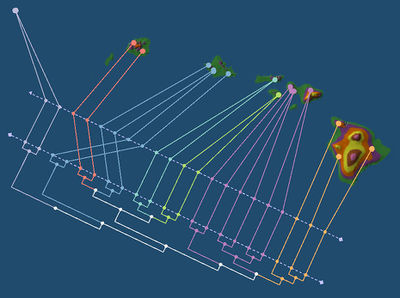Difference between revisions of "GenGIS Tutorials"
| Line 31: | Line 31: | ||
=== Tutorial 3: The ''Ensatina eschscholtzii'' ring species === | === Tutorial 3: The ''Ensatina eschscholtzii'' ring species === | ||
| − | The ''Ensatina eschscholtzii'' salamander from the western United States is a classic example of allopatric speciation. In this tutorial, we demonstrate how GenGIS can be used to analyze non-linear geographic | + | The ''Ensatina eschscholtzii'' salamander from the western United States is a classic example of allopatric speciation. In this tutorial, we demonstrate how GenGIS can be used to analyze non-linear geographic gradients (Parks and Beiko, 2009). |
* [[West Coast Salamander Tutorial | West Coast Salamander Tutorial]] | * [[West Coast Salamander Tutorial | West Coast Salamander Tutorial]] | ||
Revision as of 18:59, 2 March 2012
We have put together a few tutorials to get you quickly started with GenGIS.
Contents
- 1 Tutorial 0: Obtaining Custom Digital Elevation Maps (DEM)
- 2 Tutorial 1: Banza Katydids of the Hawaiian Islands
- 3 Tutorial 2: Marine Microbial Communities from the Atlantic Seaboard
- 4 Tutorial 3: The Ensatina eschscholtzii ring species
- 5 Tutorial 4: Custom Data Visualizations and Movies
- 6 References
Tutorial 0: Obtaining Custom Digital Elevation Maps (DEM)
The simple way to obtain DEMs suitable for use in GenGIS is described here. An older set of instructions on how to manually contruct a custom DEM is available here. You can also obtain 2D maps compatible with GenGIS using MapMaker.
Tutorial 1: Banza Katydids of the Hawaiian Islands
In this tutorial, we consider the phylogenetic tree of Banza katydids (acoustic insects) from the Hawaiian Islands recently recovered by Shapiro et al., 2006. This tutorial gives an overview of the GenGIS interface, demonstrates how to load data, and illustrates how to change the visual properties of a map, location markers, and trees. The tutorial concludes with an analysis which suggests geography has had a substantial influence on the evolution of Banza katydids.
Tutorial 2: Marine Microbial Communities from the Atlantic Seaboard
In this tutorial, we examine samples collected as part of the Global Ocean Sampling expedition (Rusch et al., 2007) in order to investigate the influence of environmental factors on the composition of microbial communities from marine ecosystems. This tutorial demonstrates how to load data, illustrates how to change visual properties, presents a detail analysis of the geographic structure of these microbial communities, and examines the distribution of taxa within these samples.
Tutorial 3: The Ensatina eschscholtzii ring species
The Ensatina eschscholtzii salamander from the western United States is a classic example of allopatric speciation. In this tutorial, we demonstrate how GenGIS can be used to analyze non-linear geographic gradients (Parks and Beiko, 2009).
Tutorial 4: Custom Data Visualizations and Movies
We have put together a number of examples illustrating how custom data visualizations and movies can be created using the API exposed to the Python console:
- An example showing how GenGIS can be used to visualize the mobility rates of HIV-1 subtype B in Europe as proposed by Paraskevis et al. (2009) has been posted here. This example includes a Python class demonstrating how a custom visualization can be made.
- Short examples of using the Python API to access data are available in the GenGIS manual.
- Details on creating fly-through movies with GenGIS are available in the GenGIS manual.
References
Shapiro LH, Strazanac JS, and Roderick GK. 2006 Molecular phylogeny of Banza (Orthoptera: Tettigoniidae), the endemic katydids of the Hawaiian Archipelago. Mol. Phylogenet. Evol. 41:53-63. Pubmed
Rusch DB, Halpern AL, Sutton G, et al. .2007. The Sorcerer II Global Ocean Sampling Expedition: Northwest Atlantic through Eastern Tropical Pacific. PLoS Biol. 5:e77. PubMed
Parks DH and Beiko RG. 2009. Quantitative visualizations of hierarchically organized data in a geographic context. Geoinformatics 2009, Fairfax, VA.
